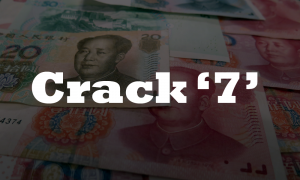
China Contemplates Allowing the Renminbi to ‘Crack 7’
Posted on 06/17/2019
China is taking hits it has not experienced in a very long time. U.S. President Donald Trump is coercing the Middle Kingdom on a daily basis, exerting pressure via his favorite channel Twitter, on opposite number Xi Jinping to acquiesce to a trade deal. But it’s not just the tweeter-in-chief who is putting the squeeze on China, the European Union (EU) also wants a better deal and political ructions in Hong Kong have added to the gloomy outlook for Beijing.
For the leadership in China more important than jumping into any imbalanced trade settlement is social stability. We know the Chinese economy has slowed and the People’s Bank of China is vigorously calibrating behind the scenes to keep the vast growth engine ticking over. The nation of 1.4 billion people (18.5 percent of the global population) cannot let its economic progress slide to a point where the blue-collar workers and entrepreneurs feel real pain or mass unemployment. But neither can it be seen to be caving in to external threats, particularly from the United States. It is expected but not confirmed that Xi and Trump will meet face to face during the upcoming G-20 Summit and Ministerial Meetings in Osaka, Japan on the 28th and 29th of June, but will either side blink before then?
Crack 7
One obvious short-term option open to the Chinese to ease the economic stress is to tweak the renminbi. In one move the country’s central bank could alleviate the pain being felt by China’s exporters and their related subsidiary industries. No. 8 has long been regarded as the luckiest number in Chinese culture. However, cracking the psychologically sensitive 7 renminbi to one U.S. dollar level could prove advantageous since it can quickly reduce some of the tariff increases. But the downside would be the fallout of confidence in the Chinese currency, potentially leading to capital outflows. Furthermore, these measures would impact China’s goal of having renminbi used in more international transactions.
A solid currency is essential for China to maintain its long-term target of running an investment-driven economic model. Renminbi stability is also essential to its well flagged aspirations of being accepted on global capital market indexes.
People’s Bank of China Governor Yi Gang said recently that no specific level for the Chinese currency is important, and gave his assurance it will continue to be relatively strong once the noise of the trade war has diminished.
He also said to the media, “It’s a little bit weaker, because of the tremendous pressure from the U.S. side.”
Backed into a Corner
Meanwhile, despite the trade spat, domestic consumption according to Chinese officials remains robust in China. Domestic consumption is regularly touted by Chinese leaders as a new growth engine, which will eventually counterbalance the dependence on an export driven economy.
But the worsening U.S.-China trade relations have begun to squeeze the Chinese middle class who are seeing dwindling wages and declines in property values, where many have the bulk of their wealth. What does it have to lose if China goes its own way and lets the renminbi slide? The country has already been pilloried on numerous occasions by both Democrats and Republicans in the U.S. as a currency manipulator.
Trade Talks?
Should trade talks post the G-20 meeting be unresolved and the U.S. moves to impose the proposed 25 percent tariffs on US$ 300 billion in Chinese exports, many analysts believe the Chinese currency will then quickly push through the 7 renminbi to one U.S. dollar level.
According to Tommy Ong, managing director for treasury and markets at DBS Hong Kong the chances of the renminbi breaking 7 are increasing.
“Policy makers are more comfortable with letting the level go now, as there’s no intense bearish speculation in the offshore market and trade tensions are intensifying,” Ong told Bloomberg news recently.
But any move by China to significantly devalue the renminbi as a counter to U.S. trade tariffs would not only propagate the U.S.-China rift but seriously aggravate other major trading partners in Europe as well as Japan and South Korea. Such a scenario would likely see collateral fallout hitting emerging markets across Southeast Asia. In the aftermath of the 2015 Chinese currency devaluation emerging market currencies tumbled.
Vasileios Gkionakis, Head of FX Strategy and Homin Lee, Macro Strategist Asia at Lombard Odier, weighed in to say in a recent report, “A major devaluation would be an instrument of ‘ultimate resort’ to be used only if negotiations between the US and China completely break down and the situation escalates into a full-blown trade war, with no holds barred.
Keywords: Peoples Bank of China.
